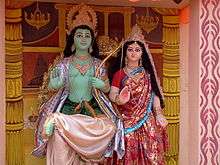Jai Siya Ram
Jai Siya Ram (or Jai Siyaram) is a Hindi expression, translating as "Glory to Sita and Rama". Sociologist Jan Breman states that it was used as "a greeting of welcome in the countryside since time immemorial".[1]

Usage
Worship
Jai Siya Ram is used while worshipping Ram and Sita. It is often used during the recital of Ramayana, Ramcharitmanas and Sunderkand.[2][3] Many devotional songs with the theme Jai Siya Ram have been sung by singers such as Jagjit Singh, Mohammed Rafi among others.[4][5][6] Similar songs have been sung in various regional languages.[7] The chants of Jai Siya Ram are very common in religious places and gatherings, for example Kumbh Mela.[8][9]
In politics
On 5 August 2020, Prime Minister Narendra Modi started his Ram Mandir ground breaking ceremony speech with Jai Siyaram.[10][11][12] He also urged the attendees to chant Jai Siyaram.[13] Modi also said, "The call of Jai Siya Ram is resonating not only in the city of Lord Ram but throughout the world today. I express gratitude to all citizens of this nation, Indian diaspora across the world and all the devotees of Lord Ram on this pious occasion."[14]
Priyanka Gandhi also used the expression in a tweet related to Ram Mandir on 4 August 2020.[15]
Other uses
Slogans of Jai Siya Ram had also been chanted in the Supreme Court in 1992 by Vishva Hindu Parishad.[16]
Each stanza of the Punjabi folk song, "Expectation of Today's Wife", starts with the line Jai Siya Ram, Jai Jai Siya Ram.[17] The slogan has also been used as a greeting by the Bharatiya Janata Party (BJP) and the Rashtriya Swayamsevak Sangh (RSS). During riots in Jaipur in the 1990s, the phrase was used to indicate that one is a Hindu.[18]
References
- Breman, Jan (1999), "Ghettoization and Communal Politics: The Dynamics of Inclusion and Exclusion in the Hindutva Landscape", in Guha, Ramachandra; Parry, Jonathan P.; Beteille, Andre (eds.), Institutions and Inequalities: Essays in Honour of Andre Beteille, Oxford University Press, p. 270, ISBN 978-0-19-565081-5
- https://www.youtube.com/watch?v=0P9_6pWqW10
- "6.1 Many Ramayanas: text and tradition - The Ramayan". Coursera. Retrieved 15 August 2020.
- "Jai Siya Ram by Jagjit Singh". Apple Music. Retrieved 14 August 2020.
- "Making Hinduism a monopoly business: Why Shiv Sena is wrong to prevent Nawazuddin Siddiqui's Ramlila performance". Times of India Blog. 8 October 2016. Retrieved 15 August 2020.
- Jai Raghunandan Jai Sitaram (From "Gharana") (Full Song & Lyrics) - Raghupati Raghav Raja Ram - Download or Listen Free - JioSaavn, retrieved 15 August 2020
- Jai Siya Ram, retrieved 14 August 2020
- "Chants of 'Jai Shree Ram' fill air as sadhus march for holy dip". The Indian Express. 30 August 2015. Retrieved 13 August 2020.
- Balajiwale, Vaishali (14 September 2015). "More than 25 lakh devotees take second Shahi Snan at Nashik Kumbh Mela". DNA India. Retrieved 14 August 2020.
- "From Laos to Lanka, Ram is everywhere: PM Modi in Ayodhya". India Today. 5 August 2020. Retrieved 5 August 2020.
- "'Jai Siyaram' call resonating throughout the world: PM Narendra Modi". The Times of India. 5 August 2020. Retrieved 5 August 2020.
- "Long wait ends today: PM chants 'Jai Siya Ram' in Ayodhya". Punjab News Express. 5 August 2020. Retrieved 5 August 2020.
- "Ram Mandir Live Bhumi Pujan Updates: Ram Mandir will become the modern symbol of our traditions, says PM Modi". The Financial Express. 5 August 2020. Retrieved 5 August 2020.
- "With Jai Siya Ram, PM Modi departs from Jai Shri Ram chant at bhoomi pujan". India Today. 5 August 2020. Retrieved 5 August 2020.
- Khan, Fatima (4 August 2020). "'Ram belongs to everyone' — Priyanka Gandhi endorses Ram Mandir bhoomi pujan in Ayodhya". ThePrint. Retrieved 5 August 2020.
- Gehlot, N. S. (1993). "16: Agony and Ecstasy in Ayodhya Tangle: Implications of the Revival of the Ram Temple Issue". In Gehlot, N. S. (ed.). Politics of Communalism and Secularism: Keeping Indians Divided. Deep & Deep Publications. p. 216. ISBN 978-81-7100-497-3.
- Vaid, Sunil (21 June 2013). Don't Slap Your Wife: But Don't Get Slapped Either. Random House India. p. 57. ISBN 978-81-8400-446-5.
- Mayaram, Shail (1993). "Communal Violence in Jaipur". Economic and Political Weekly. 28 (46/47): 2530, 2532, 2536, 2537. ISSN 0012-9976.